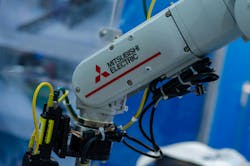Japan and Taiwan Energy Tech Firms Teaming to Increase MW Conversions of Renewable Energy Resources
Japan-based Mitsubishi Electric Corp. is going to work with Taiwan’s Industrial Technology Research Institute (ITRI) to develop megawatt-level power conversion systems (PCS) driven by semiconductors to gain more electricity generation from renewable energy resources.
The collaboration is one of many happening around the industry as the power demands grow from the rise of artificial intelligence tools and models, hyperscale data centers and industrial electrification. Many hope this load growth will be matched by greater deployment of low-carbon technologies and resources.
“Integrating green energy efficiently through next-generation power conversion technologies has become a critical challenge for supporting industrial development in the energy transition,” said Jwu-Sheng Hu, Executive Vice President, ITRI, in a statement. “Furthermore, this technological partnership combines ITRI’s system integration capabilities with Mitsubishi Electric’s power semiconductor technology, enabling a more efficient introduction of green energy into the power grid and supporting the development of advanced high-tech industries.”
As part of the agreement, Mitsubishi Electric’s advanced power semiconductor modules and Mitsubishi Electric Taiwan’s marketing capabilities will be combined with ITRI’s technology for efficiently converting high-voltage, high-current electricity. The goal is to jointly develop a megawatt-class PCS prototype equipped with the power semiconductor modules for demonstration testing.
Mitsubishi Electric provides high-voltage, high-current power semiconductor modules for PCS used in renewable-energy power generation, storage, transmission and distribution. Mitsubishi Electric modules are widely used in markets worldwide identified for their stable performance under harsh environmental conditions.
“Moving forward, Mitsubishi Electric will continue to promote ‘trade-on’ activities that balance solutions to social challenges with business growth through the global promotion of power semiconductor modules, striving towards the realization of a sustainable society,” said Masayoshi Takemi, Executive Officer and Group President, Semiconductor & Device at Mitsubishi Electric.
ITRI develops technologies focused on the circular economy and low-carbon manufacturing utilizing renewable energy systems. Its focus includes expertise in power generation, storage, transmission and distribution systems that utilize high-voltage, high-current electricity.
The need to energize these future gigawatt-scale data computing facilities is creating a rush to develop new power generation both inside and outside the electric utility model. Computer chip and processing unit manufacturer NVIDIA recently announced it collaborate with global energy technology giants such as ABB, Eaton, Schneider Electric and Hitachi Energy on work creating new power solutions for the expected rise of artificial intelligence (AI) data centers around the world.
"As AI demands continue to grow around the world, data centers require new approaches to power distribution that improve efficiency and simplify designs,” said Dion Harris, senior director, HPC, Cloud and AI Infrastructure at NVIDIA, several days ago.
About the Author
EnergyTech Staff
Rod Walton is senior editor for EnergyTech.com. He has spent 17 years covering the energy industry as a newspaper and trade journalist.
Walton formerly was energy writer and business editor at the Tulsa World. Later, he spent six years covering the electricity power sector for Pennwell and Clarion Events. He joined Endeavor and EnergyTech in November 2021.
He can be reached at [email protected].
EnergyTech is focused on the mission critical and large-scale energy users and their sustainability and resiliency goals. These include the commercial and industrial sectors, as well as the military, universities, data centers and microgrids.
Many large-scale energy users such as Fortune 500 companies, and mission-critical users such as military bases, universities, healthcare facilities, public safety and data centers, shifting their energy priorities to reach net-zero carbon goals within the coming decades. These include plans for renewable energy power purchase agreements, but also on-site resiliency projects such as microgrids, combined heat and power, rooftop solar, energy storage, digitalization and building efficiency upgrades.
